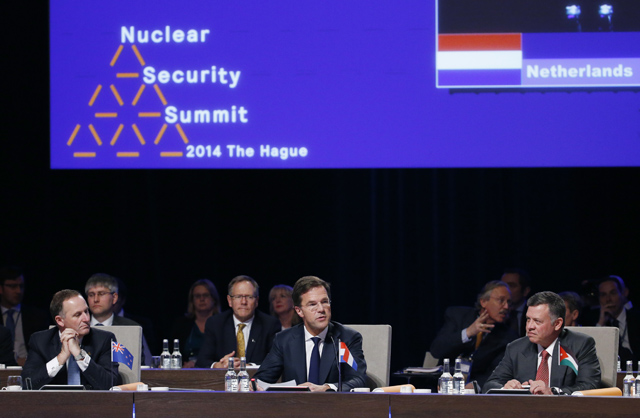AMMAN — His Majesty King Abdullah on Monday called for international joint efforts to pre-empt any nuclear disaster, urging partners to instil a culture of nuclear security across the board.
In his remarks at a working dinner held by Dutch King Willem-Alexander and Queen Máxima in honour of participants at the Nuclear Security Summit 2014, held in The Hague, the King said: “We simply cannot wait for such a catastrophe to happen before we act. We must be ahead and stay ahead of the threat.”
According to a Royal Court statement, King Abdullah, who headed Jordan’s delegation to the high-profile summit, was speaking at the dinner on behalf of more than 50 states taking part in the two-day summit.
He urged an anti-nuclear armament culture as a prerequisite for nuclear security.
His Majesty said that nuclear security demands a two-layer shield, namely, tough security precautions and transparency that contributes to an alert and confident public.
Outlining the Kingdom’s efforts in the field, the Monarch said that Jordan has made nuclear security and cooperation a priority, noting that the Kingdom would soon ratify the International Convention for the Suppression of Acts of Nuclear Terrorism.
He called for a “strong joint communiqué and the follow-up it needs”.
To enhance cooperation, he urged partners to contribute to the effort through information sharing, technologies and training.
The Jordanian delegation to the summit comprises Foreign Minister Nasser Judeh, King’s Office Director Imad Fakhoury, HH Prince Zeid Raad, Jordan’s permanent representative to the UN, and Jordanian Ambassador to the Netherlands Ahmad Mefleh.
More than 5,000 delegates are attending the summit along with representatives of regional and international organisations.
The summit was first initiated by US President Barack Obama, who, in a speech delivered in 2009 in Prague, described nuclear terrorism as one of the greatest threats to international security and called for joint international efforts to prevent nuclear terrorism by agreeing on specific points to help achieve nuclear security.
Sideline meetings
On the sidelines of the summit, King Abdullah held talks with head of delegates and key figures participating in the meeting.
He met with UN Secretary General Ban Ki-moon, Dutch Prime Minister Mark Rutte and Russian Foreign Minister Sergei Lavrov.
Talks covered bilateral ties and prospects for further cooperation at all levels, in addition to the latest regional and international developments, according to the statement.
His Majesty underlined Jordan’s stance in supporting efforts to bring about comprehensive and just peace between Palestinians and Israelis according to the two-state solution, international resolutions and the 2002 Arab Peace Initiative.
He stressed the need for the efforts to arrive at the establishment of an independent and viable Palestinian state on the 1967 borders with East Jerusalem as its capital.
Discussions also focused on the latest developments in Syria. The King called for hammering out a comprehensive political solution to the crisis to end the suffering of Syrians, citing the burdens Jordan is enduring due to hosting the largest number of Syrian refugees.
King Abdullah noted that the Kingdom, which holds a UN Security Council seat representing Arab Asia and the Far East, seeks to play a role in entrenching security, stability and world peace and help overcome crises facing nations.
During his meeting with the Dutch prime minister, the Monarch commended the Netherlands for hosting the nuclear summit to contribute to improving international cooperation and awareness on issues related to security and peace, the statement said.
According to The Hague conference’s literature, the main priorities of the summit this year were defined as: strengthening the international legal regime through bringing the amended Convention on the Physical Protection of Nuclear Material into force, improving nuclear security assurances and broadening the NSS process to address radioactive material and military sources of nuclear material in addition to nuclear fissile material emphasised in the 2010 and 2012 summits.
